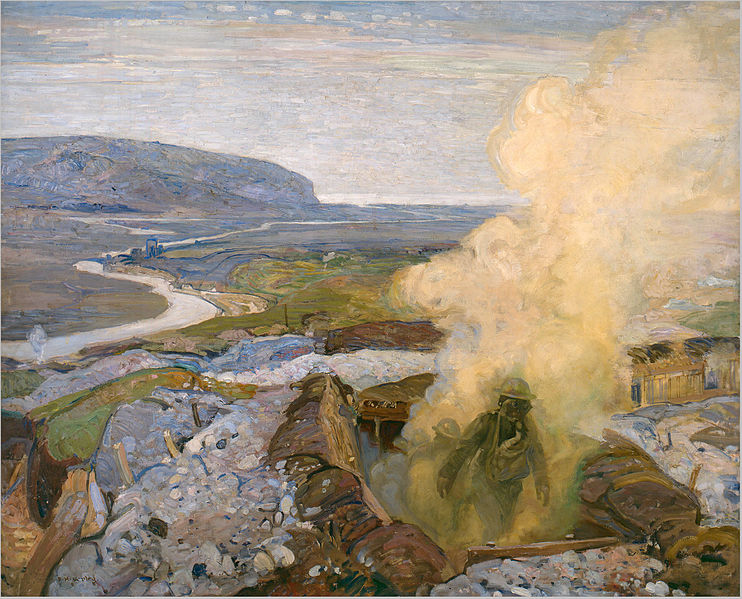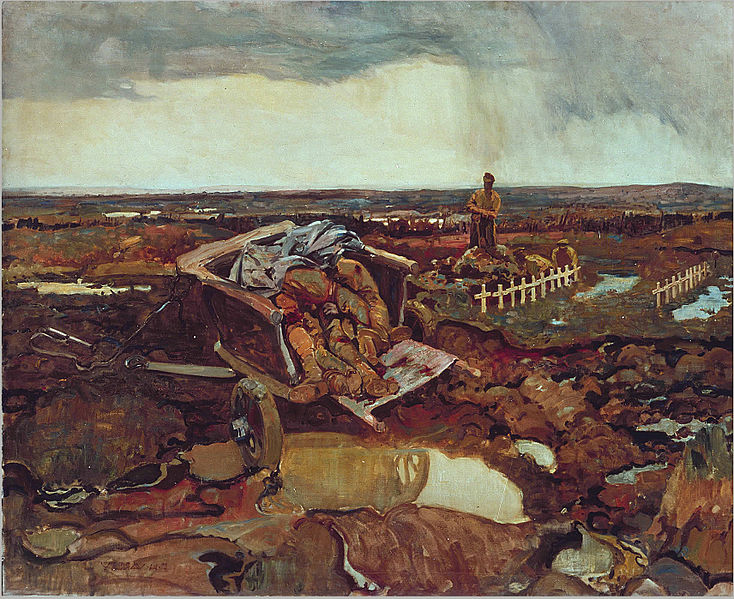Canadian War Artists of WWI
Today is Remembrance Day. On this, the eleventh day of the eleventh month, at 11 o’clock an armistice was signed that ended Word War I. While today Remembrance Day is observed as a means to honour the sacrifice of members of the armed forces that have died in all wars, World War I was a particularly atrocious 4 years in modern European history, effectively the last great spasm of empirical powers, wasting the lives of millions of combatants and civilians with a wide range of never-before-seen weapons including chemical weapons.
DULCE ET DECORUM EST
Bent double, like old beggars under sacks,
Knock-kneed, coughing like hags, we cursed through sludge,
Till on the haunting flares we turned our backs
And towards our distant rest began to trudge.
Men marched asleep. Many had lost their boots
But limped on, blood-shod. All went lame; all blind;
Drunk with fatigue; deaf even to the hoots
Of tired, outstripped Five-Nines that dropped behind.
Gas! Gas! Quick, boys! – An ecstasy of fumbling,
Fitting the clumsy helmets just in time;
But someone still was yelling out and stumbling,
And flound’ring like a man in fire or lime . . .
Dim, through the misty panes and thick green light,
As under a green sea, I saw him drowning.
In all my dreams, before my helpless sight,
He plunges at me, guttering, choking, drowning.
If in some smothering dreams you too could pace
Behind the wagon that we flung him in,
And watch the white eyes writhing in his face,
His hanging face, like a devil’s sick of sin;
If you could hear, at every jolt, the blood
Come gargling from the froth-corrupted lungs,
Obscene as cancer, bitter as the cud
Of vile, incurable sores on innocent tongues,
My friend, you would not tell with such high zest
To children ardent for some desperate glory,
The old Lie; Dulce et Decorum est
Pro patria mori.
Wilfred Owen
8 October 1917 – March, 1918
There was quite a lot of poetry and literature inspired by WWI – Wilfred Owen, for instance, was considered one of the pre-eminent British poets of the time. I originally misidentified Owen as a Canadian poet, but was corrected – see the comments at the end of this post. The better known poem “In Flander’s Fields” by John McCrae, a Canadian, is a bit more palatable. Perhaps unsurprisingly it is “In Flanders Fields” that school children memorize.
IN FLANDERS FIELDS
In Flanders fields the poppies blow
Between the crosses, row on row,
That mark our place; and in the sky
The larks, still bravely singing, fly
Scarce heard amid the guns below.
We are the Dead. Short days ago
We lived, felt dawn, saw sunset glow,
Loved, and were loved, and now we lie
In Flanders fields.
Take up our quarrel with the foe:
To you from failing hands we throw
The torch; be yours to hold it high.
If ye break faith with us who die
We shall not sleep, though poppies grow
In Flanders fields.
– John McCrae
Dec. 8, 1915
As part of the war effort, Canada sent a number of official war artists overseas. Fred Varley, a member of the Group of Seven was one of them.
Here is one of his pieces from towards the end of the war showing a gas training facility in England.

Gas Chamber at Seaford – Fred Varley, 1918
Horrfying, but bucolic. The impressionistic use of colour makes this painting quite beautiful, really, for all the grotesquerie. There is also an eerily surreal juxtaposition, seeing these young men in this idyllic seaside setting training to be gassed in the nightmare world of the battlefields of the Western Front.
This next painting was started in 1917 but only finished in 1919, and shows the ravaged landscape and bodies of young men stacked like cordwood. There is no beauty, although there is a lot of impact. The title, “For What?” is a sentiment echoed by many veterans of World War I. While we take the time today to honour the sacrifice of the dead, it is worth noting that countless of these deaths were completely wasted in an orgy of carnage for little to no strategic value, such as trench warfare.
In 1915, the second Battle of Ypres established the reputation of the Canadians as a fighting force. The 1st Canadian Division had just arrived on the Western Front when they won recognition by holding their ground against a new weapon of modern warfare – chlorine gas.
It was also in the trenches at the second Battle of Ypres that John McCrae wrote the poem In Flanders Fields when a close friend was killed, one of 6000 Canadian casualties in just 48 hours.
– Canada Online

For What? – 1917-1919 – Fred Varley
Frederick Varley’s For What? portrays a cart filled with bodies collected from the battlefield. It starkly portrays the horror of war and questions its purpose. In a letter dating from mid-May 1919 to his wife, Maud, this eminent Canadian artist summed up his feelings about the war.
“I’m mighty thankful I’ve left France – I never want to see it again. This last trip over has put the tin hat on it. To see the land half cultivated & people coming back to where their homes were is too much for my make up. You’ll never know dear anything of what it means. I’m going to paint a picture of it, but heavens, it can’t say a thousandth part of a story. We’d be healthier to forget, & that we never can. We are forever tainted with its abortiveness & its cruel drama – and for the life of me I don’t know how that can help progression. It is foul and smelly – and heartbreaking. Sometimes I could weep my eyes out when I get despondent… To be normal, to be as those silly cows & sheep that do naught but graze & die, well, it’s forgetfulness.”
– wikipedia
For further reading, I recommend All Quiet on the Western Front by Erich Maria Remarque for the German perspective, or Vimy by Pierre Berton (Canada’s greatest historical writer). To view more of Canada’s war art & learn more about the role of official war artists, visit the Canadian War Museum.
Lest we Forget is the Remembrance Day motto – personally, I intend to remember not only our own dead, but the other side, too, and an entire generation wasted over imperialist posturing – as well as the uncounted millions of civilian dead. Let’s not just remember the dead, let’s remember how utterly pointless so many of their deaths were, and what a tragedy that is.



Nice blog, but…I thought Wilfred Owen was English?
I always thought he was Canadian, but I looked it up and… You’re absolutely right. I stand corrected.